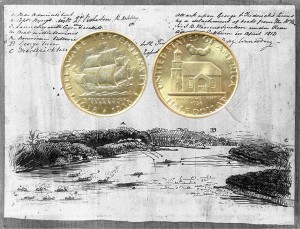Today, the Delaware Tercentenary Commemorative Silver Half Dollar remembers the events of 202 years ago.
From the 1858 book by Joel Munsell, The Every Day Book of History and Chronology, on April 29, 1813, British Admiral Cockburn burned the storehouses at Frenchtown, Delaware on the Chesapeake Bay.
These storehouses held a large supply of goods belonging to the merchants of Philadelphia and Baltimore.
Admiral Cockburn also burned two vessels and plundered the private houses.
From a different viewpoint, the 1813 Delaware Statesman newspaper printed the following:
=====
Battle of Frenchtown.
On Thursday [April 29, 1813], four or five barges filled with men, made an attack on Frenchtown.
The neighboring militia, stationed in their little fort, defended the place until all their ammunition was expended, when they retreated and the English took possession.
Landed and marched towards Elkton, about two miles off where the Frenchtown packets lay. They did not reach Elkton. After having discovered the flag at the fort they returned to Frenchtown where they burnt two store houses, two fish houses, one old sloop, and spiked the cannon—and then left this place which was immediately taken possession by the volunteers of the vicinity.
The English loss was two wounded, (one of whom was their commander) and one killed, who was buried between Frenchtown and Elkton. We have not heard of any killed or wounded on our side.
Wilmington, April 30.
Chesapeake Squadron.
The English have possession of Pesusa Island, which lies inside the mouth of the river Susquehannah. While they keep this island, the passage of mail at the usual place must be considered extremely dangerous.
=====
From the Federal Gazette of April 29, 1813:
=====
Yesterday about six hundred of the enemy, in barges, took possession of Spesutie Island, near the head of the Chesapeake; at the time of their landing there was a number of persons (it is supposed nearly one hundred) on the island, where they had went to fish—two of them escaped to the shore of Harford county and brought the above intelligence.
We hear from Kent country, in this state, that two persons were taken up a few days since on suspicion of having supplied some of the enemy’s ships with provisions. They were sent under guard to general Chambers, at Charlestown, where they were recognized by three British deserters, who declared that they had supplied the vessels from which they had deserted, with provisions. —The names of the persons arrested are not mentioned in the letter giving the above information.
=====
Earlier observations in Lewiston Delaware on April 26:
=====
This moment a British barge is in sight, taking soundings in the channel to the pitch of the Cape. Another attack appears to be contemplated.
Three persons are put under arrest here for trading with the enemy. The sloop Black Duck, mentioned in a former letter as trading with the enemy’s squadron belongs to a member of the state legislature, he has been on board several times, I am informed, and his vessel seized—the people who have seized her have found on board her two boxes of oranges, and two bags containing three or four bushels of Liverpool salt. The sloop is now about the Drawbridge at Broad Kiln.
=====
From Wilmington on April 23:
=====
Pool’s Island
The enemy’s squadron in the Chesapeake have taken this island, which lies about 17 miles above the mouth of the Patapsco and within three miles of the Eastern Shore.
It contains about 300 acres of well cultivated land, and belongs to P. Wethered, Esq. who lately resided on it.
The object of the British in taking possession is to obtain water and fresh provisions, which will be found in great plenty.
=====
The Delaware Tercentenary Commemorative Silver Half Dollar shows against a drawing of the fighting on the Chesapeake during April 1813.
